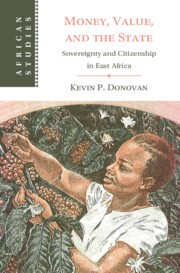Book contents
- Money, Value, and the State
- African Studies Series
- Money, Value, and the State
- Copyright page
- Dedication
- Contents
- Figures
- Acknowledgments
- A Note on the Text
- Introduction
- 1 The Moneychanger State
- 2 A Monopoly on Valuation
- 3 Restricted Value
- 4 Crimes against Economy
- 5 Magendo
- Conclusion
- Archival Collections Consulted
- Bibliography
- Index
- African Studies Series
1 - The Moneychanger State
Money after the End of Empire
Published online by Cambridge University Press: 05 December 2024
- Money, Value, and the State
- African Studies Series
- Money, Value, and the State
- Copyright page
- Dedication
- Contents
- Figures
- Acknowledgments
- A Note on the Text
- Introduction
- 1 The Moneychanger State
- 2 A Monopoly on Valuation
- 3 Restricted Value
- 4 Crimes against Economy
- 5 Magendo
- Conclusion
- Archival Collections Consulted
- Bibliography
- Index
- African Studies Series
Summary
If political independence provided Africans more latitude in how to pursue economic sovereignty, it hardly settled the matter of how it should be institutionalized. Debates about currency, for instance, persisted in East Africa after formal decolonization, and only in 1965-66 was the colonial money replaced by money issued by the independent states. This chapter traces the unexpected trajectory of decolonization, including the persistence of the imperial East African Currency Board. Decisions about the postcolonial monetary regimes were delayed, in part, by the machinations of British officials who tried to protect the racial capitalism of East Africa from the challenge of African independence. Yet, the establishment of national currencies and central banks was also delayed by Africans’ own commitment to supranational linkages, including an East African common market and currency. This chapter shows that the fortunes of a proposed East African Federation rose and fell on the dynamics of uneven and combined development in the region. And, finally, it examines how the central banking model adopted by postcolonial leaders reinforced the dependence of their nations on the accumulation of foreign currencies. The “moneychanger state,” in which postcolonial governments intermediated between domestic and foreign currencies, was critical to their own survival and ideas about development. Ultimately, though, it was the rural cultivators who would bear the burden of maintaining national solvency, a material reality that spurred a productivist ideology in which merit was revealed through earning export value.
Keywords
- Type
- Chapter
- Information
- Money, Value, and the StateSovereignty and Citizenship in East Africa, pp. 51 - 91Publisher: Cambridge University PressPrint publication year: 2024

